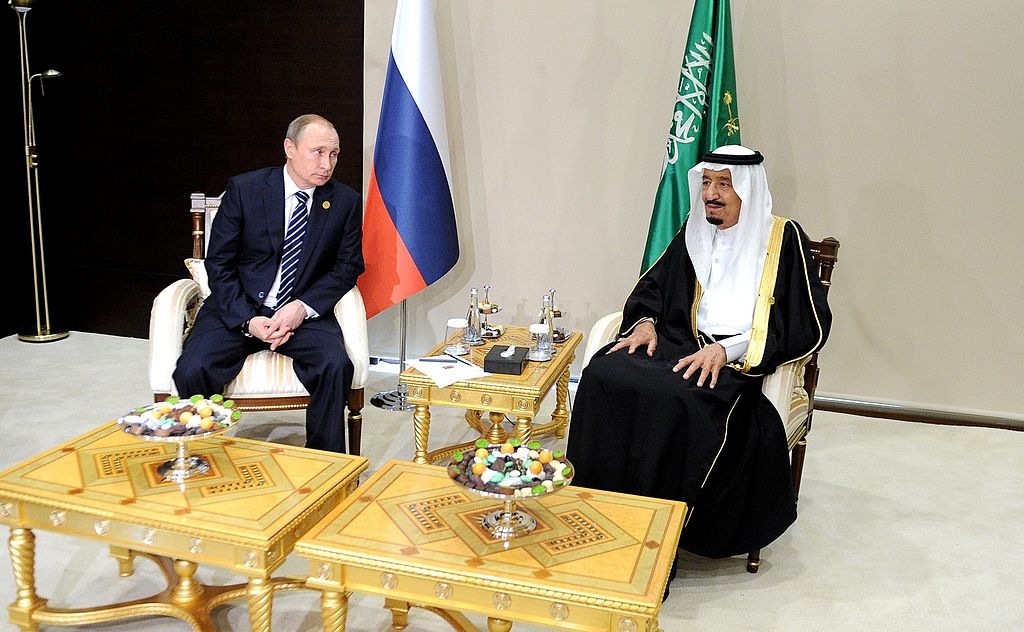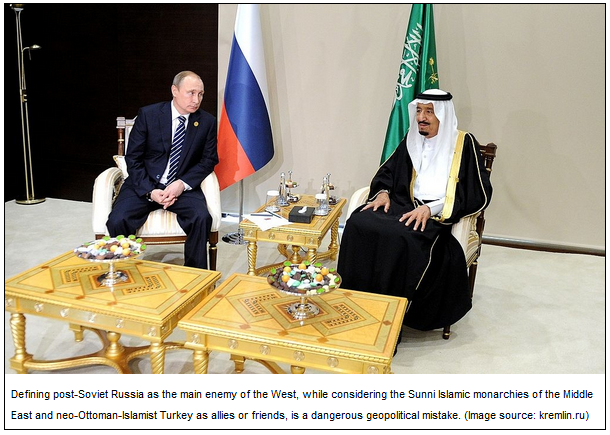Defining post-Soviet Russia as the main enemy of the West, while considering the Sunni Islamic monarchies of the Middle East and neo-Ottoman-Islamist Turkey as allies or friends, is a dangerous geopolitical mistake. The primary interest of the West and the main mission of NATO is not to demonize regimes it does not like, such as Putin’s authoritarian kleptocracy or other non-democratic states that do not pose a direct military threat. Rather, it is to safeguard our land, sea, airspace and populations.
In order to accomplish this, however, we have define the “enemy.” In the military and strategic sense of the word, an enemy is an entity that truly threatens our short- and long-term survival and vital interests — not one that simply does not share our concept of democracy and human rights.
Radical Islamism meets this definition, since its adherents aim to replace our way of life in the West through their antagonist theocratic system of Sharia (Islamic law). This is a clear challenge to our democratic-secular order and to Judeo-Christian civilization.
Islamic terrorists are tools — a human non-conventional weapon employed even by “friendly” organizations (for example, the Muslim Brotherhood, Organization of Islamic Cooperation, Muslim World League, World Islamic Congress) and states (such as Saudi Arabia, Turkey, Pakistan, Kuwait and Qatar) to destroy the West. They do this by playing a double game: They are our economic allies, but simultaneously support those who openly aim to subjugate our nations to Sharia.
Russia may be an enemy of Ukraine; it is perceived as a threat to Poland, as well. However, it does not aim to destroy Judeo-Christian civilization. On the contrary, post-Soviet Russia espouses Orthodox-Christian values that are similar to those of many Western Christian conservatives. Nor does Moscow plan to attack the United States.
Another dangerous geopolitical mistake made by Western societies is viewing only Islamic terrorist groups as enemies and targeting them in a vacuum. Equally, if not more, important to combat are those Islamist movements that condemn terrorism but spread their ideology “peacefully” in our countries. Theirs is not merely a fundamentalist or revivalist doctrine, such as that espoused by certain Christian or Jewish groups, but rather a totalitarian political-religious ideology, capable of jeopardizing all of humanity. This is because its ultimate goal is to dominate the world, much like Nazism and communism.
Therefore, sending troops to Middle Eastern countries to fight terrorists on the battlefield is useless when the radical Islamist ideology of those terrorists is being spread “legitimately” in mosques and madrassas in the region and on our soil, often with the support of our governments and multiculturalist lobbies. In other words, tackling the “foot soldiers” while allowing the doctrine to flourish is an exercise in futility.
Another problem the West has yet to grapple with is philosophical — it cooperates with Muslim states and opens up its societies to radical Islamist groups without any form reciprocity. Muslim countries and non-governmental organizations take advantage of Western democracy to engage in activities — such as proselytizing — that they themselves prohibit. In the West, they enjoy freedom of speech and religion. At home, they imprison or execute non-Muslim and Muslim “apostates” alike.
As the late political philosopher Karl Popper wrote in The Open Society and Its Enemies:
“If we extend unlimited tolerance even to those who are intolerant, if we are not prepared to defend a tolerant society against the onslaught of the intolerant, then the tolerant will be destroyed, and tolerance with them.”
The current situation can be traced back to decades of geostrategic errors and counter-productive wars. One classic example among many — such as in Pakistan, Turkey, the former Yugoslavia and Macedonia — was Operation Cyclone, the CIA backing of a jihadist group, the Mujahedeen, against the Red Army, prior to, during and after the Soviet invasion of Afghanistan at the end of 1979.
This short-sighted move, to support a fanatical Islamist group to fight a different enemy, was born out of an “anti-civilizational” paradigm — one that minimizes the power of culture and religion as driving forces. It is a model still used by many Western strategists, who compare American aid to the Mujahedeen to that given to the Nicaraguan Contras in 1981 and to the Polish Solidarity movement in 1980.
It is a false comparison. Unlike the fanatical Mujahedeen and their fighters, the Contras and Solidarity trade unionists had no megalomaniacal, totalitarian goals. Their only aim was freedom from tyranny.
Today, it is imperative that we not allow internal battles in Washington to prevent us from acknowledging the wider conflict, which rears its ugly head with every car-ramming attack in a European capital, and to create a strategy to save the West from its most immediate enemy.
A three-pronged approach is in order:
Before launching military campaigns on behalf of human rights, we in the West should first invest in strengthening our values at home, and encourage our Muslim minorities to adopt those values, rather than let them fall into the hands of radical Islamist organizations.
The West must stop demonizing its own Judeo-Christian-European identity and rid itself of multiculturalist extremism.
A new “Pan-Western” strategy should be created to enhance and cement the U.S.-Old Europe bond, and to encourage Russia to be a part of it. It is time to focus on the actual enemy — the one on our doorstep placing our societies in its crosshairs.
 Defining post-Soviet Russia as the main enemy of the West, while considering the Sunni Islamic monarchies of the Middle East and neo-Ottoman-Islamist Turkey as allies or friends, is a dangerous geopolitical mistake. (Image source: kremlin.ru) Defining post-Soviet Russia as the main enemy of the West, while considering the Sunni Islamic monarchies of the Middle East and neo-Ottoman-Islamist Turkey as allies or friends, is a dangerous geopolitical mistake. (Image source: kremlin.ru) |
Alexandre del Valle is a French writer, professor, columnist and political commentator focusing on radical Islam, new geopolitical threats, civilizational conflicts and terrorism. He is the author, most recently, of “Les vrais ennemis de l’Occident: Du rejet de la Russie à l’islamisation des sociétés ouverte” (“The real enemies of the West: From the rejection of Russia to the Islamization of open societies”).
























